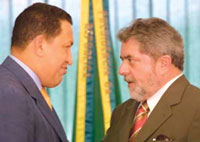| |
Vol. 224 No. 3 |
 |
 |
| MAYRA RODRÍGUEZ VALLADARES, CONTRIBUTING EDITOR, SOUTH AMERICA |
MAYRA RODRÍGUEZ VALLADARES
Venezuela and Brazil again dominate Latin American energy politics. The region feels neglected by the US; it was the only area not mentioned in President Bush’s State of the Union Address.
Venezuela suffers worst political crisis in decades. The political/economic battle has escalated to such a dangerous degree that the US, UN, OAS, Brazil, Chile, Mexico, Portugal and Spain have been mediating between President Chávez and the opposition, to find a solution. Venezuelans have not seen a worse crisis since they adopted a constitutional democracy in 1958. Last year, the economy contracted 8%. Analysts predict that it could decline 25% or more this year, if conditions worsen. Unemployment has hit 17% and is rising.
As war with Iraq has grown more likely, oil from the world's fifth-largest exporter has become more important. The US receives 15% of its imports from Venezuela, so this crisis impacts far beyond South America.
To resolve the crisis, former US President Jimmy Carter presented proposals to officials and the opposition. One idea is a constitutional amendment that cuts the presidential term to four years from six, leading to an early vote. The other convenes a recall referendum in August. Negotiations, however, are difficult. Also, if the opposition ignores the constitution and forces Chávez to resign early, it could risk polarizing the population and prolonging violence.
The symbol of Chávez – as a break from Venezuela’s corrupt political past – has tarnished in the last four years. He has become symbolic of what not to do in leading a country, or its main company, Petróleos de Venezuela (PDVSA). Instead, he has been masterful at running PDVSA into the ground. He has often pushed unreasonable, unprofitable transactions. The most infamous was supplying oil to Cuba at terms that were extremely unfavorable to PDVSA.
Now the people’s sentiments about PDVSA have turned positive, as they rally around the company. PDVSA looks poised to regain its role as a source of national pride. Opposition leaders had hoped to use the PDVSA strikes and cessation of oil output and exports as a weapon to oust Chávez. Indeed, the strike nearly halted output, which fell to about 200,000 bopd in December, instead of the usual 3 million bopd.
After thousands of PDVSA workers joined an opposition strike last December, company executives have been restructuring the firm into two regional units. These units will concentrate on core production and refining. Since workers went on strike, 9,000 company staff have been fired out of a 33,000 total.
Also, the oil strike has forced PDVSA to cut its 2003 budget by $2.7 billion, to about $6 billion. Expenditures could be reduced 40%, and investment by 30%. These cuts may foreshadow a big production fall in a country that depends on oil for half of its governmental spending. Yet, publicly, PDVSA executives state that the company can meet its debt repayments. Management contends that PDVSA could count on $2 billion in its macroeconomic stabilization fund, while also trying to issue bonds.
 |
| |
Venezuelan President Hugo Chávez (left) has found a friend in new Brazilian President L. I. Lula da Silva. |
|
The critical need for funding is evident. PDVSA President Ali Rodríguez has announced that the firm will probably sell some of its assets, once a feasibility report on its businesses is completed.
Despite the turmoil, Chávez announced in late January that he would assign licenses for large gas blocks in the eastern, offshore Delta Platform. Venezuela has five exploration blocks for foreign investors in the area south of Trinidad, where it believes huge reserves could feed a new LNG plant. Whether he will carry out this promise, and whether oil companies and investors will be comfortable, remains to be seen.
Although far from a pre-strike production level (3.1 million bopd), PDVSA insisted that it could extract 1.5 million bopd. Rodríguez believed output could reach 2.8 million bopd in March. Opposition leaders called these forecasts overly optimistic, because the 2003 budget is being cut to offset the two-month revenue slide. Dissident oil workers also contend that output is at 1.1 million bopd.
Market analysts fear the country has lost significant productive capacity. Moreover, Venezuela is in great need of experienced managers and engineers to re-start operations. PDVSA managers and skilled oil professionals say they will continue striking.
Brazilian presidential honeymoon. Luiz Inacio Lula da Silva, a left-wing union leader who did not finish elementary school, seems to be showing that he might be capable of leading the world’s fourth most populous democracy and ninth largest economy. The Bovespa stock market in Sao Paulo and the real currency are both strengthening. Inflation is falling from last year’s highs.
After one month in office, polls show that nearly 80% of Brazilians believe Lula will do at least a good job leading Brazil. He won points by suspending a $700-million jet fighter contract, stating that he will use the money to take his cabinet to tour the poorest ghettos, and to promote social programs.
This enthusiasm might not last if he is unable to pass badly needed reforms, such as overhauling expensive pension and tax systems. Moreover, he must reduce the country’s significant debt burden – about 56% of GDP.
Lula has managed to provoke outrage in Venezuela among that country’s opposition. Brazil’s Foreign Affairs Advisor, Marco Aurelio Garcia, argued that the oil price could reach $50 to $60/bbl if a conflict with Iraq is prolonged. Hence, Lula had Brazil send 520,000 bbl of oil to the Chávez government. Venezuela’s opposition saw this as left-leaning Lula’s meddling in the country, only because Chávez is a leftist. 
Mayra Rodriguez Valladares is president of MRV Associates Inc. in New York. She is a regular contributor to this column.
|





